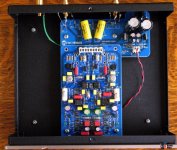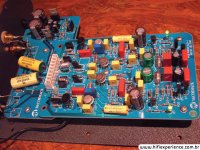HELP... 22 VAC DIY power supply
Hi
HELP!
I have to build a new power supply for my McCormack Micro Phono Drive.
Been looking online trying to find schematics for a very quiet 22 VAC power supply.
Only needs 500ma
Any help with where to look would be greatly appreciated.
Thanks!
Per
Hi
HELP!
I have to build a new power supply for my McCormack Micro Phono Drive.
Been looking online trying to find schematics for a very quiet 22 VAC power supply.
Only needs 500ma
Any help with where to look would be greatly appreciated.
Thanks!
Per
Last edited:
Here is his comment on a supply, it's just a transformer:
Hi Guys -
I used the same wall-wart for all of the "Micro" series preamps - a reasonably hefty 22VAC / 500mA unit. All of the Micros take AC in and do the rectification on-board. You can use a 24VAC transformer if you wish (although this will create more waste heat in the Headphone and Integrated drives). There is really no reason to ever choose a transformer (for the Micros) with less than 500mA capability, but there is no upper limit - go ahead and use a big sucker if you wish. I agree that bigger sounds better, all else being equal, but "all else" is rarely equal and you can't just assume that a different-but-bigger transformer will necessarily be sonically superior. With low-current-consumption gear like the Micro Phono Drive you will hit the point of diminishing returns pretty quickly, so going beyond a 1A or 2A unit won't buy you much in the way of performance. The Avel toroids mentioned are an excellent choice (and are available in 22VAC, which is convenient).
Best regards,
Steve McCormack, designer
SMc Audio
Hi Guys -
I used the same wall-wart for all of the "Micro" series preamps - a reasonably hefty 22VAC / 500mA unit. All of the Micros take AC in and do the rectification on-board. You can use a 24VAC transformer if you wish (although this will create more waste heat in the Headphone and Integrated drives). There is really no reason to ever choose a transformer (for the Micros) with less than 500mA capability, but there is no upper limit - go ahead and use a big sucker if you wish. I agree that bigger sounds better, all else being equal, but "all else" is rarely equal and you can't just assume that a different-but-bigger transformer will necessarily be sonically superior. With low-current-consumption gear like the Micro Phono Drive you will hit the point of diminishing returns pretty quickly, so going beyond a 1A or 2A unit won't buy you much in the way of performance. The Avel toroids mentioned are an excellent choice (and are available in 22VAC, which is convenient).
Best regards,
Steve McCormack, designer
SMc Audio
Last edited:
Transformers don't make "noise". They pass noise from a crappy power line. They radiate hum into adjacent equipment. But I don't see any reason to replace the transformer.
The output of a transformer is BIG HUM. It's like the worst thing we can feed our geat, but it is the only cheap source of power. There is a AC-to-DC supply inside the gear which has the job of turning big hum into *clean* DC power.
As Rayma is saying: the most likely reason for a gradual rise of noise is the filter caps inside the gear.
A second possible problem is crappy appliances on the same power line. But this would influence *all* your hi-fi, and so a whole-system power filter is appropriate.
The output of a transformer is BIG HUM. It's like the worst thing we can feed our geat, but it is the only cheap source of power. There is a AC-to-DC supply inside the gear which has the job of turning big hum into *clean* DC power.
As Rayma is saying: the most likely reason for a gradual rise of noise is the filter caps inside the gear.
A second possible problem is crappy appliances on the same power line. But this would influence *all* your hi-fi, and so a whole-system power filter is appropriate.
Hey
It’s a hissing noise, and when certain frequencies are happening on the record, there is a sibilant distortion that occurs.
I have run tests on cartridge set up, and it is done right
(Used another amp w built in phono...)
None of my other components are making any noise.
There is a slight hiss from the amp, but that’s the AC.
P
It’s a hissing noise, and when certain frequencies are happening on the record, there is a sibilant distortion that occurs.
I have run tests on cartridge set up, and it is done right
(Used another amp w built in phono...)
None of my other components are making any noise.
There is a slight hiss from the amp, but that’s the AC.
P
Some images and stuff.
"a hissing noise" is not the transformer, or even the power supply capacitors.
There's always some hiss, universal law of Nature. I am hoping you are not over-reporting it.
After that, hiss in a phono preamp "can" be repeated abuse of the input transistors. Replacement is the fix. Sadly the selection of good LOW hiss parts is in decline.
I personally do not like the look of that 9-pin connector. I would gently lift that board a couple mm and slide it back a few times to work off tarnish on the pins. (Looks like you have to loosen some Phillips head screws.)
"a hissing noise" is not the transformer, or even the power supply capacitors.
There's always some hiss, universal law of Nature. I am hoping you are not over-reporting it.
After that, hiss in a phono preamp "can" be repeated abuse of the input transistors. Replacement is the fix. Sadly the selection of good LOW hiss parts is in decline.
I personally do not like the look of that 9-pin connector. I would gently lift that board a couple mm and slide it back a few times to work off tarnish on the pins. (Looks like you have to loosen some Phillips head screws.)
Attachments
- Status
- This old topic is closed. If you want to reopen this topic, contact a moderator using the "Report Post" button.
- Home
- Amplifiers
- Power Supplies
- Newbie Question - 22VAC Power supply McCormack Micro Phono Drive

